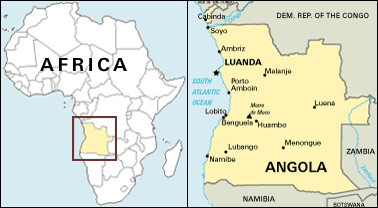Editor's note: Grad student Kristin Reed will be filing regular dispatches from Angola this summer. We'll publish her dispatches online here. This is Kristin's first report.
Civil war has been a way of life in Angola since its independence from Portugal in 1975. In a country with a population of 12 million, war has claimed 1.5 million lives. In April, 2002 the two parties in this 27-year war signed a ceasefire accord. Despite displacing between 2.5 and 4 million people and destroying a majority of the country's infrastructure, the war never stopped Angola's oil production.
As part of my graduate work in Environmental Science, Policy and Management here at UC Berkeley, I will travel to Angola this summer to examine the impact of the oil industry on Angola's natural resources and on the communities which are dependent on these resources.
Angola's oil production has quadrupled since 1980, with the average annual oil rent tax of $2.1 billion fueling the government army in its fight against UNITA (National Union for the Total Independence of Angola).
Production, now about 850,000 barrels per day, is soon expected to reach one million barrels a day, about half of which will be exported to the U.S. Oil production and the supporting activities are vital to the Angolan economy, accounting for about 45 percent of GDP and 90 percent of exports.
Onshore oil producing/processing historically has been associated with various environmental and human health hazards. Accidental oil spills and the practice of flaring of natural gas at the wellhead has had an impact on local communities (e.g. in Nigeria, Sudan, Indonesia, etc.) that are dependent on the industry. However in Angola, a majority of the oil is produced offshore. While distance mitigates the negative impacts of any spills, it also decreases a community's ability to claim any benefits from the oil such as a share of the revenues or compensation through developmental assistance.
Recent International Monetary Fund and nongovernmental organization reports have indicated government errors in accounting of oil revenues – on the scale of about $4 billion in oil revenues reportedly missing over the past five years. These statistics have received a great deal of attention internationally, bolstering the call for the government to account for the responsible spending and distribution of oil revenues. Furthermore, they highlight the contrast between the resource wealth of the country and the poverty of its people – a 1995 survey estimated that 70 percent of all households in the capital city of Luanda live below the poverty line.
This summer, I will speak with government officials, representatives of the national oil company Sonangol, non-governmental organizations, and laborers working within the oil industry. Furthermore, I will perform archival research to create a historical picture of oil exploration in Angola from the colonial era, through the war for independence and the civil war, up to the present. This analysis will encompass both the structures and processes of the large upstream (pumping and production) and nascent downstream (refining) elements of the industry, the dynamics of offshore versus onshore oil production, the role of multinational oil corporations in development programs in Angola, and the effects of the international movement for financial transparency within the oil industry.
Simply stated, I seek to understand the ways in which the oil industry in Angola has changed over time and how it has shaped the lives of Angolans over a tumultuous period of history.
— Kristin Reed



